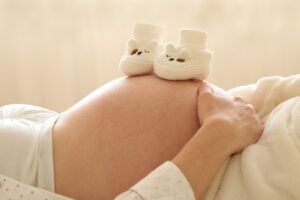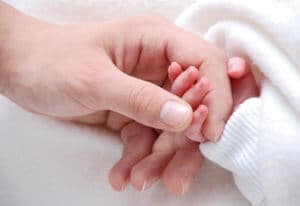Table of contents
Prohibition of employment during pregnancy – to protect the unborn child
Employment ban pregnancy – In Germany, pregnant women and their unborn children are subject to special protection. It is regulated in the Maternity Protection Act and covers all dangers that may emanate from the pregnant woman’s workplace, from substances that pose a health risk or from unusual workplace situations. The prohibition of employment during pregnancy and the risk assessment of pregnancy serve to maintain the health of mother and child and to exclude all hazardous situations. The competent authority is the Federal Ministry for Family Affairs, Senior Citizens, Women and Youth.
The general ban on employment during pregnancy
Although the existing Maternity Protection Act, in which the ban on employment during pregnancy is integrated, was passed 65 years ago, it contains a large number of modern factors that are binding and must be observed. The individual prohibitions concern the following areas:
- all substances hazardous to health, such as gases, vapours, X-rays or laser beams
- all risks of infection
- extreme workplaces that involve the risk of accidents
- Assembly line and piecework
- with a few exceptions, work on Sundays and public holidays
- Night work between 8 p.m. and 6 a.m
The personal prohibition of work during pregnancy
Every pregnancy is as individual as a person’s life. Therefore, only your attending gynaecologist can best assess your state of health during your pregnancy. If complications arise, he or she will probably refer you to a hospital for further examinations. Depending on the risk assessment of your pregnancy, doctors may therefore also completely ban you from working during your pregnancy. In the case of a high-risk pregnancy, your doctor can also certify that you are not allowed to work during your pregnancy because of the health risks involved.
Rest periods before and after childbirth
The Maternity Protection Act prohibits mothers from working for 6 weeks before giving birth and for 8 weeks after giving birth. Your employer is not allowed to employ you during this period. However, since your doctor determines the probable date of birth when he or she diagnoses your pregnancy, your downtime can be planned. Deviations are possible, as not every baby is born on the exact date calculated. As soon as your maternity protection law employment ban begins, you will receive replacement benefits from your health insurance fund instead of the usual continued payment of wages during pregnancy. The so-called maternity protection benefit is paid in accordance with the law 6 weeks before and 8 weeks after childbirth.
Pregnancy is not an illness
Of course, expectant mothers have not only rights but also duties. First of all, they must inform their employer of their pregnancy as soon as possible with the appropriate certificate from the gynaecologist. If they do not do so, they are not entitled to all the benefits that a ban on employment during pregnancy entails. They can neither expect consideration nor benefit from the legislation. The duty to inform the employer is therefore an absolute necessity.
And since pregnancy is a beautiful thing as opposed to an illness, women who carry a baby under their hearts must also work while pregnant until the day maternity leave begins. General incapacity for work is, of course, excluded from this and is not to be equated with a ban on employment pregnancy.
Employment ban by the employer
As a rule, employers do not ban pregnant women from working. However, there are exceptions to the rule. In workplaces where, for example, there is an increased risk of infection, as is the case in hospitals or nursing homes, it can happen that the employer himself issues a ban on employment, although he is not the legitimate contact person for a risk assessment during pregnancy.
Instead, he should try to provide the employee concerned with a workplace where health risks are excluded. It is also advisable to contact the competent health insurance fund in advance and discuss the problem with them. This is because a ban on employment by employers is generally linked to continued payment of wages. However, if he consults the health insurance fund, he may be able to be exempted from continued payment of wages with a corresponding ban on employment through the employer form. This could be the case, for example, in a small car repair shop where no adequate alternative workplace is available.
As a rule, employers do not issue a prohibition of employment during pregnancy. However, exceptions confirm the rule here as well. In workplaces where, for example, there is an increased risk of infection, as is the case in hospitals or nursing homes, it can happen that the employer himself issues a ban on employment, although he is not the legitimate contact person for a risk assessment during pregnancy. Instead, he should try to provide the employee concerned with a workplace where health risks are excluded.
It is also advisable to contact the competent health insurance fund in advance and discuss the problem with them. This is because a ban on employment by employers is generally linked to continued payment of wages. However, if he consults the health insurance fund, he may be able to be exempted from continued payment of wages with a corresponding ban on employment through the employer form. This could be the case, for example, in a small car repair shop where no adequate alternative workplace is available.
However, a ban on employment during pregnancy by employers is rather rare. Supervisors know very well that they are entering a very sensitive area here. However, there are also expectant mothers who absolutely want to work while pregnant, even if they should not do so from a medical point of view. In such cases, the prohibition of employment by employers is a sensible measure to protect mother and child.
The question of costs
Who actually pays the wages in the case of an employment ban? In the case of a medical prohibition of employment during pregnancy, the continued payment of wages is covered by the health insurance fund, so that employers do not suffer any financial disadvantages. In the case of a prohibition of employment during pregnancy by the employer, which is not based on a medical certificate, the supervisor must ensure continued payment of wages, unless prior agreement has been reached with the health insurance fund.
In the case of a risk pregnancy ban on employment, continued payment of wages during pregnancy is ensured by the health insurance funds. This also applies to the Maternity Protection Act prohibition of employment.
The question of “who pays in the event of a ban on employment?” is thus clearly clarified, as this is an area of responsibility of the health insurance funds.












